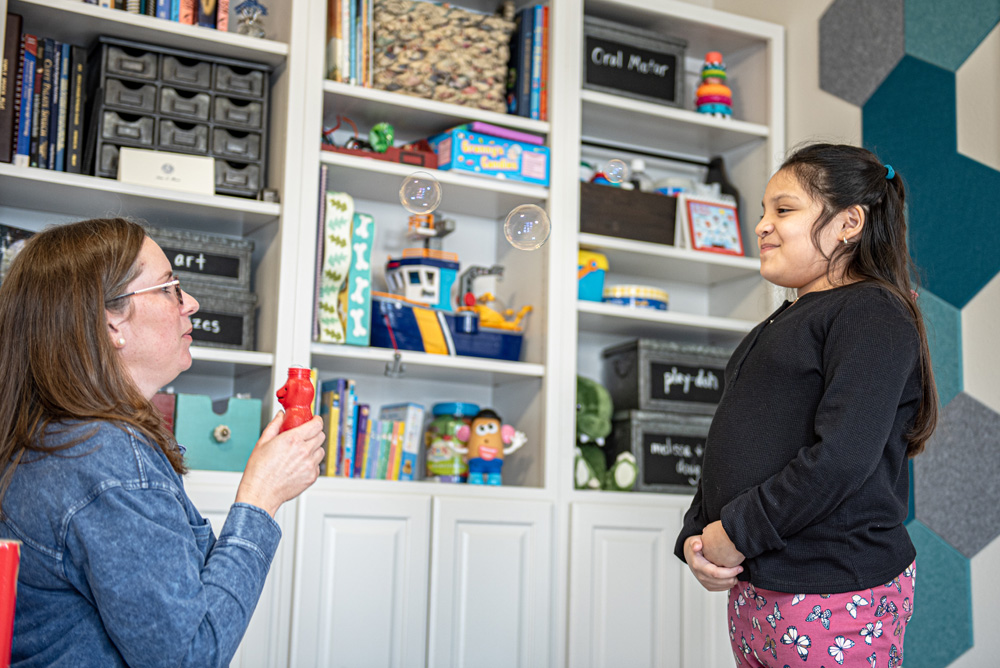Your voice is produced in the larynx (voice box) when your vocal folds vibrate as you exhale. This vibration creates the sound we use for speech and singing.
Voice disorders can cause hoarseness, breathiness, pitch breaks, or changes in vocal quality. A voice that is consistently too loud, too soft, or noticeably strained may indicate an underlying issue.
While some voice changes result from yelling, prolonged speaking, or vocal strain, others may signal a medical concern. Timely voice therapy can often restore healthy vocal function and, in some cases, help prevent the need for surgery.
Voice disorders fall into three main categories:
✔ Functional Voice Disorders – Caused by improper voice use or strain without structural damage. This can result from vocal overuse, misuse, or muscle tension dysphonia.
✔ Organic Voice Disorders – Resulting from structural changes in the vocal cords due to nodules, polyps, cysts, or medical conditions like reflux or neurological disorders.
✔ Neurological Voice Disorders – Related to nerve damage or neurological conditions affecting vocal cord function, such as spasmodic dysphonia, vocal fold paralysis, or Parkinson’s disease.




Your voice plays a vital role in expression, work, socialization, and emotional connection. When voice difficulties arise, they can impact:
✅ Speech clarity and projection
✅ The ability to engage in conversations comfortably
✅ Professional voice use (teachers, singers, speakers, etc.)
✅ Vocal endurance and ease of speaking
The good news? Voice therapy helps individuals of all ages improve vocal function and maintain a strong, healthy voice.
The intricacies of voice production involve multiple anatomical structures. The vocal folds must function harmoniously for optimal vocal quality. Any disruption in this process can lead to voice disorders, which can significantly affect one’s ability to communicate effectively.
If you or your child experience persistent voice challenges, early evaluation is key! Some common signs of voice disorders include:
For Children:
✔ Chronic hoarseness or strained voice
✔ Frequent voice loss after talking or yelling
✔ A voice that sounds too soft or too harsh
For Adults:
✔ Chronic hoarseness or breathy voice quality
✔ Voice fatigue or discomfort after speaking
✔ Inconsistent voice strength or pitch breaks
✔ Complete voice loss or difficulty controlling loudness
If voice changes last longer than two weeks, a voice evaluation can help determine the best course of action.

Vocal health and function evolve over time, and voice changes or disorders can occur at any stage of life.
Infants use their voices to cry, coo, and squeal, developing early vocal patterns. As children grow, they learn to control pitch, volume, and tone, using their voices to express emotions, emphasize meaning, and communicate effectively.
Throughout life, voice quality may be influenced by growth, hormones, vocal habits, medical conditions, or aging. A voice evaluation can provide valuable insight into maintaining, strengthening, or restoring vocal health.

Recognizing and addressing voice disorders early can lead to improved outcomes. Delaying treatment can result in chronic voice issues, which may require more extensive interventions.
Many individuals assume voice problems will resolve on their own. However, persistent voice issues often indicate underlying problems that need evaluation. Consulting a speech-language pathologist (SLP) for voice therapy can help prevent further complications.
Voice difficulties can arise from various behavioral, medical, or neurological factors. Common causes include:
✔ Vocal Overuse or Misuse – Excessive yelling, throat clearing, or improper speaking techniques.
✔ Medical Conditions – Acid reflux, allergies, chronic cough, or upper respiratory infections.
✔ Structural Changes – Nodules, polyps, cysts, or scarring on the vocal folds.
✔ Neurological Disorders – Spasmodic dysphonia, Parkinson’s disease, or vocal fold paralysis.
Understanding the cause of a voice disorder helps determine the best treatment approach!

Voice disorders can affect quality, endurance, and comfort while speaking. During a voice evaluation, a Speech-Language Pathologist (SLP) will:
✔ Analyze vocal quality – Assess hoarseness, breathiness, or strain
✔ Evaluate pitch, loudness, and endurance – Determine how the voice functions under stress
✔ Assess vocal habits – Identify any patterns of overuse or misuse
✔ Collaborate with medical professionals – If needed, work with ENT specialists to examine the vocal cords
✔ Develop an individualized treatment plan
A professional voice assessment provides valuable insight into vocal health.

Voice therapy is customized to each individual’s needs, focusing on techniques to improve vocal function, reduce strain, and enhance endurance.
✔ Vocal Hygiene Education – Strategies to protect the voice and prevent damage.
✔ Breath Support Training – Techniques for improving airflow and vocal projection.
✔ Resonance Therapy – Adjusting tone and placement for a more effortless voice.
✔ Relaxation & Stretching Exercises – Reducing muscle tension and strain in the throat.
✔ Voice Conservation Strategies – Learning how to use the voice efficiently to avoid fatigue.
With structured, engaging therapy, individuals can strengthen vocal endurance, reduce discomfort, and improve overall voice quality!


Your voice is a key part of self-expression and connection. When voice challenges arise, therapy can help improve clarity, endurance, and vocal health at any age.
📌 Key Points to Remember:
✔ Voice disorders can impact speech clarity, endurance, and comfort.
✔ Early evaluation helps prevent long-term strain or damage.
✔ A voice assessment helps determine the best treatment approach.
✔ Therapy provides customized techniques to strengthen and protect the voice.

Contact Simply Speech today. Let us help you regain your voice and enhance your communication abilities. Remember, early intervention is key. Your voice matters, and we are here to help you every step of the way!